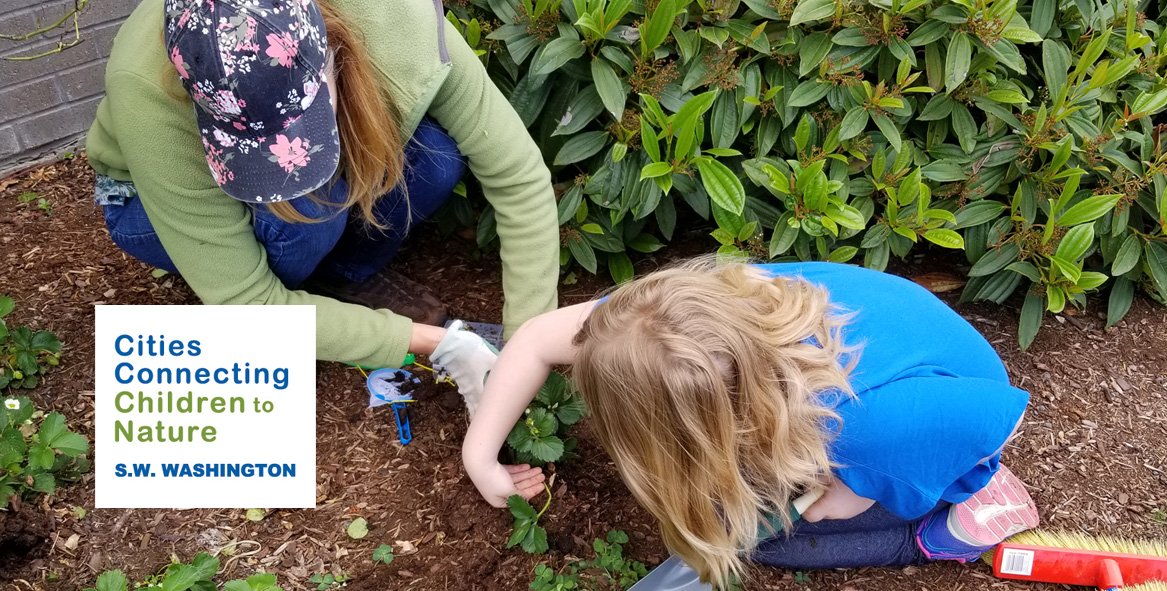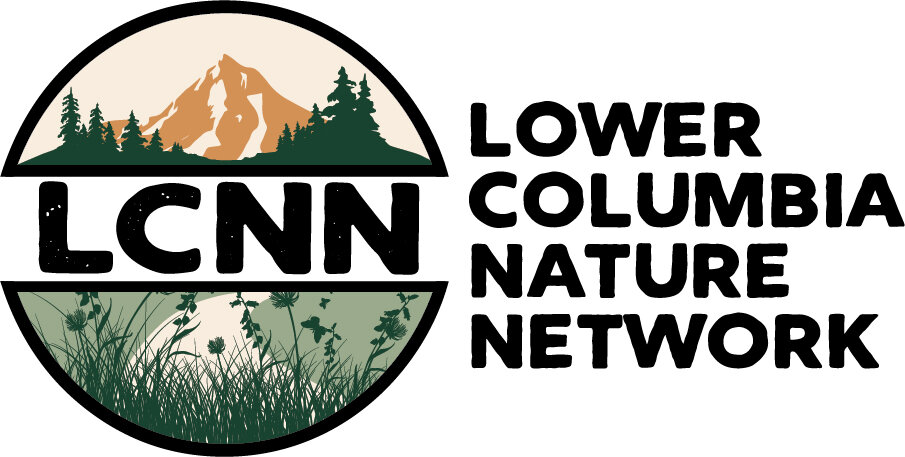
SW WA GREEN SCHOOLYARDS
The Lower Columbia Nature Network is partnering with the Children & Nature Network and National League of Cities for the 2021-2023 cohort to bring more equitable access to nature for our school communities across southwest Washington.
The Cities Connecting Children to Nature work takes a Systems Change approach to creating a movement and building support across the communities. This work involves not just schools, but local cities, Clark County and various partners throughout the community. We look for opportunities and mutually aligned goals to work for healthy communities using Green Schoolyards as a unifying approach. It goes beyond commonly held beliefs and explores new approaches to support creating safe, welcoming and equitable campuses that enhance learning, play and wellness. Join us as we green southwest Washington!
Do you have ideas or feedback about the plan?
Please reach out to us and let us know your ideas for Greening our area schools. We want to help!
email us hello@lowercolumbianaturenetwork.org
-

Steering Committee
The project Steering Committee consists of partners from around the region, who are working together to form an Action Plan in 2023.
Meeting #1 - September 2022 notes
Meeting # 2 - November 2022 notes
Meeting #3 - January 2023 notes
Meeting #4 - March 2023 notes
Meeting #5 - May 2023 notes
Community forums - future community forum(s) and discussions will broaden the conversation with staff, students, families and partners.
Working documents:
- Padlet exercise #1 - Action Plan Ideas and priorities
- Padlet exercise #2 - Headline exercise - What do we want now and in 5 years
- Padlet exercise #3 - Raising awareness of GSY in SW WA - Elevator speeches
-

SW WA Green Schoolyards Action Plan
The CCCN Project goals are to bring partners together from around the community to support schools in creating equitable access to nature for play, learning and wellness.
This section will include information as the Steering Committee formulates an action plan for supporting schools. There are numerous goals that are shared by partners, including:
Awareness and Communications - spreading the word about GSY and their benefits, as well as examples in our community
Activation - once spaces are built, there are lots of ways to engage staff, students and the community to use outdoor spaces
Policies - there are great examples from around the country to help with development of GSY, curriculum for outdoor learning, maintenance and more
Maintenance & Stewardship - bring together examples of successfully maintained spaces and tips to share with our communities
Features - there are a wide range of features that support outdoor learning and use, including addressing safety, equity and accessible use for all
DRAFT SW WA Green Schoolyards Action Plan - This is a living document to best serve our regional schools with their planning, installation, program and maintenance of Green Schoolyards
-

Green Schoolyard Resources
Green Schoolyards are campuses that use the whole campus for learning and includes a variety of features from fence to fence to engage staff, students and the community to connect with nature. Here are more resources:
Children & Nature Network (C&NN)
Green Schoolyards Resource HubC&NN Resources for Cities to connection children to nature
Green Schoolyards America
Living Schoolyards on-line library of resourcesTrust for Public Lands
Green Schoolyards initiativeClark County Green Schools
Green Schoolyards interactive map of schools with featuresCity of Vancouver Climate Action Plan - some of the mitigation goals in this plan can be addressed with GSY projects
Lower Columbia School Gardens - serving Kelso/Longview School District
OSPI Washington state Environmental and Sustainability Literacy Plan (v.2.0) - 2022
RCO / OSPI Outdoor Learning Grant - WA State funds for public school programs to get students outdoors learning optons
Bringing nature back to school
Green schoolyards are nature rich campuses with trees, flowers, gardens, paths, inclusive play and diverse learning opportunities. They provide spaces for all to enjoy and connect with nature, whether it is part of recess, an after-school program, classroom learning or hanging out with family and friends on the weekends.
Children & Nature Network - What is a Green Schoolyard?
Green Schoolyards across SW WA
Did you know that our region is one of the leaders in Washington for Green Schoolyard projects? Almost every district in our region has some type of GSY project on their campuses, including:
Raised garden boxes (vegetables and sensory play)
Native habitat gardens & tree plantings
Outdoor classrooms and messy maker spaces
Inclusive playgrounds & nature play
Click on the map to see search the school projects
Other ways SW WA is leading nature connections for kids and families
The Cities Connection Children to Nature initiatives involve more than just Green Schoolyards, including Out-of-School Time, Youth Leadership Development, Green Career Exposure & Early Childhood Nature Connections, at more than 40 cities across the country.
In our community, we also have:
Nature Smart Libraries - Our Fort Vancouver Regional Library system provides Check Out Washington backpacks for families, hosts storytime in nature settings through partners and outdoor related programs like StoryWalks.
Nature play - Local parks and school grounds are now including lots of logs, boulders, sensory gardens and other natural elements for inclusive play for all. Visit schools such as Evergreen PS new bond sites (Sifton, Image, Emerald, Marrion, Ellsworth, Mill Plain, Burton) or Vancouver PS bond sites (King, Truman, Walnut Grove).
Enhancing Nature in Public Spaces - several partners are increasing access to diverse and native plantings throughout local spaces, such as school grounds (butterfly gardens), CPU Pollinator Project, Clark College Pollinator project, the Vancouver Bee Project and the City of Vancouver’s Naturespaces program. Several partners work with schools and youth to help plant and monitor the new plantings, as well as provide career training and curriculum support.
EPS Sifton Elementary nature play area
Hudson’s Bay HS students plant pollinator garden at CPU Electric Center
City of Vancouver connects kids to nature
LCNN and CCCN met with City leadership in September 2022 to learn about the various ways that their teams connect kids to nature, especially with / at schools. Here are some key programs:
Urban Forestry - In partnership with districts, UF teams seek to increase urban tree canopy, expand tree equity to all neighborhoods and educate kids and families about the values of trees. Recently, they have partnered with Evergreen Schools to plant trees at elementary and middle schools.
Parks, Recreation & Cultural Services - The city has partnered with schools for decades with shared use agreements for parks and school campuses, summer camps are hosted at several local schools and they partner for Youth Opportunity Passes for students to visit community centers. Lots of other connections, as well.
Volunteer coordination - The city’s robust volunteer program can work with students and schools for stewardship opportunities, especially on joint city park/school properties for trash removal, ivy pulls and Naturespace programs.
Climate Action Planning - The City’s new plan includes youth voices and their input to make changes in our community. Area high school students can play a role in implementing action items, including mitigation strategies.
COV’s Urban Forestry team plants trees around the EPS Pioneer Elementary playground area to add shade with families Spring 2022





